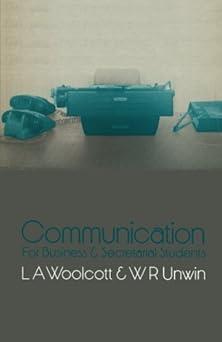Read the following passage carefully and then attempt the questions given below. We are witnessing two simultaneous
Question:
Read the following passage carefully and then attempt the questions given below.
We are witnessing two simultaneous revolutions: the scientific revolution and the revolution of rising expectations. And the second is the product of the first.
The world has been reduced in time and distance to a small planet round which a man-made satellite can travel sixteen times a day. The astronauts, on their way to and from the moon, reminded us by comment and television pictures that Earth is a minor planet in the solar system. No place in the world is more than a few hours away by jet propulsion, a few minutes away by inter-continental ballistic missiles, and split-seconds away by radio.
Within its limits, 3,500 million people have to contrive to live together. It has become a neighbourhood.
Communication, the all-pervading radio, has made people everywhere aware of change. We have seen the epidemic of freedom. In 1945 there were fifty-two countries in the United Nations. Today there are 125. Most of the new nations were the subject peoples of the great empires of twenty-five years ago. What Harold Macmillan called the 'winds of change' were in fact etheric-radio-winds. The demands for independence spread throughout the world. With each successful claim others followed suit. Events outside a country reverberated in the Council Chambers of the United Nations, and the debates in the U.N. reverberated within the countries themselves.
But independence was not the only change which people assumed was coming their way. To the aspirations, the intangibles of freedom, were added the expectations, the material substance of freedom. As the advanced countries boasted their great achievements people everywhere began to expect that the wit of man could do something about their conditions of life, about their sickness, their hunger, their poverty. And the unfulfilment of these expectations has produced resentments and frustrations. Today the confrontation is not between East and West as it was a few years ago, but between North and South, between the scientific and technologically underprivileged countries.
There is little doubt that we could fulfil the expectations. But the scientific and technological revolution is spinning faster and faster and the revolution of rising expectations is turning fitfully like the millstone in a windmill. It is ironical that human ingenuity can send people round the moon and bring them back bang on target but that we cannot solve the problems of this have travelled over two million miles and have been to most places in the world to see how science and technology could be applied to the wellbeing of mankind. One thing I know, it is not a question of lack of knowledge but of lack of intention. If we shared our knowledge and skills we could reduce the disparity between the prosperity of the developed countries and the poverty of the underdeveloped.
We say that ignorance of the law is no excuse. Ignorance of science is no excuse. The first does not mean that everyone has to be articled to a solicitor and the second does not mean that everyone should be a B.Sc. It is not necessary to practise science in order to understand it any more than one has to be able to write poetry or compose music in order to appreciate them.
What blocks the understanding of science for ordinary people is the language of science - the jabberwocky - and two other things: that if it takes all those clever chaps all those years to learn it, how can the common man grasp it?
And, the fear of science. People forget penicillin and remember the bomb.
They feel their jobs are threatened and forget that science has simplified their jobs for them.
Lord Ritchie-Calder, 'Science and the Public', Royal Society of Arts journal, March 1969
(a) Give the passage a title and summarise the first five paragraphs (i.e.
from the beginning to 'poverty of the underdeveloped') in about 130 of your own words.
(b) The author uses the word 'expectations' repeatedly in this passage; he also speaks of 'aspirations'.
(i) What do you understand to be the difference in meaning between these two words in their context?
(ii) Why do you think he uses the expression an 'epidemic of freedom'?
(iii) Even if you have not met the word 'jabberwocky' before, say, from the context, what you think it means.
L.C.C. Private Secretary's Certificate
Step by Step Answer:

Communication For Business And Secretarial Students
ISBN: 9780333261750
1st Edition
Authors: Lysbeth A Woolcott, Wendy R Unwin






